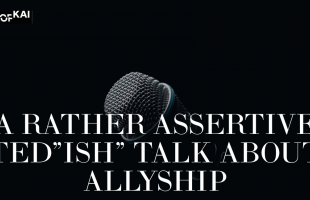
Give it to Me Straight: Trying to Find Myself in Advertising
Kiku Gross is a writer, punk rocker, and general nuisance from the Central Valley of California. If she’s being totally honest, she’s made a name for herself in the advertising industry by yelling on the internet, and she’s kind of proud of it. You may recognize her from the 3% VOICES Blog, but you probably recognize her from Twitter. When she’s not busy writing words, she enjoys drinking coffee, listening to loud music, and taking naps.
A few weeks ago, I was tasked with finding some stock photos of cars for a senior designer. I found myself on a website that was particularly tricky to navigate, so I did what I always do: ask said senior designer (read: someone with a lot of experience) for some help. Much to my relief, he also found the website supremely confusing. We spent around 20 minutes trying to find a very specific photo (spoiler alert: we never did find the photo we needed).
I’m telling you this because, somewhere around the 15-minute mark, we stumbled across some stock videos labeled, “LGBTQ Vers.”
The footage was that of your typical car ad, except the “LGBTQ” version didn’t show any people. At all. It was 30 seconds of a car speeding down a road at multiple different angles. Overhead. Wide shot. Closeup. Not a single person. Not one. You’d be forgiven for thinking it was an ad for one of those Tesla self-driving cars.
When the ad ended we both looked at each other with something combination of exasperation, disbelief, and amusement.
“Well,” he quipped, “what was gay about that?”
Answer: Nothing. Absolutely nothing at all.
And, honestly, that’s usually been my experience with trying to find myself in advertising.
My whole life has been spent searching hours on end to find something, anything I can relate to, only to find that people would much rather look at empty cars, or empty houses, or empty… whatevers, than see someone like me.
So, how does all that exposition explain what I think about LGBTQ+ representation in advertising?
Well, I find that it’s often spineless, if it exists at all.
I mean, yes. I live in California, and I definitely do see the occasional ad that is out loud and proud (so to speak). But that’s only if I travel several hours from the conservative center of the state where I live to somewhere like San Francisco or LA. And those ads aren’t doing anything for anyone anywhere else.
Sure, the rainbows come out every June, and there’s some cute hashtag like #loveislove or #loveisequal or something with the word “love” and/or “pride” in it, but I’m not only bisexual in June.
I’m bisexual the rest of the year, too.
It’s 2018 and it seems this industry is still afraid to say “GAY.”
And why? Because we’re afraid of losing customers? Because we’re afraid of alienating people? Because we’re afraid of the backlash?
Doesn’t that seem a little ridiculous?
Remember that Cheerios ad with the cute interracial family? That caused backlash. As recently as five years ago people were upset over a cereal commercial because it featured an interracial family.
Advertising is, yes, meant to sell things. But, it’s also a reflection of —and an influencer of—culture. Just as much as any other form of entertainment.
Advertising gave us the modern Santa Claus, convinced women to start shaving, and told America that a diamond was the only way to propose. If we can change public opinion on things as banal as razors and diamonds, why not do it for people?
Why won’t we use our powers for good? Just this once?
Representation normalizes people, humanizes them. And it just feels good to see yourself on TV.
Look, I’m used to not being represented at all, no matter what medium. I’m mixed race, I’m bisexual, and I like weird things like Ukrainian pop singers and 90s cult movies. My name is Kiku, for God’s sake. My entire life has been some variation of that Key and Peele substitute teacher skit (you know the one).
So, yeah, I’m used to being alone in this world. Maybe that’s part of the reason I decided to become part of the great mass media machine.
Sure, I’m young, and an idealist at heart. In years to come, I might change my tune and start sounding like many of the seniors at my agency who say, “Do you want to make good ad, or do you want to sell things?”
But until that day comes (if it comes at all), the day when I become a real adult and my heart dies, I’m going to wear it on my sleeve and put it in my work. And I hope that someone, somewhere, will follow me.
There’s still a little part of me that wants to make the world a better place. And since I’ll never be able to cure Cancer, the least I can hope to do is make someone’s life a little bit easier than mine was and let them see themselves on screen.




